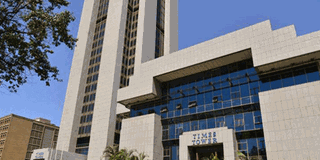KRA five-month revenue collection up 10pc

Times Tower, Kenya Revenue Authority headquarters in Nairobi.
The Kenya Revenue Authority (KRA) has recorded a 10.2 percent growth in revenue collection for the first five months of the current financial year, driven by new tax measures and positive economic recovery.
National Treasury data shows KRA netted Sh758.58 billion in tax revenue for the five months to November, an increase from the Sh688.08 billion tax revenue it collected in the same period last year.
The Treasury introduced a raft of new tax measures in July through the Finance Act, 2022 including an increment of excise duty on products such as fruit juices, cosmetics, beer, wines, spirits, and cigarettes
But with just a month to cross the first half of the fiscal year, however, KRA still lags in its race to collect the National Treasury target of Sh2.46 trillion tax revenues exclusive of grants by the end of June.
KRA collected a record Sh2.031 trillion in revenues for the financial year 2021/22 up from the Sh1.669 trillion it collected in the previous year.
This year, KRA has been given a target to collect Sh997.34 billion in taxes on income, profits, and capital gains, Sh1.04 trillion in taxes on goods and services, and Sh215.08 billion on taxes on international trade and transactions.
It also seeks to collect Sh37.64 billion in property income, Sh140.09 billion through the sale of goods and services, and Sh187.61 billion in other revenue to fund this year’s Sh3.3 trillion budget and reduce the budget deficit to lessen pressure for borrowing.
KRA will however be sweating on the prevailing high unemployment, downturn in business activities, and muted demand for goods and services amid high inflation that could derail it from achieving those targets.
Business activity within the country slowed down ahead of the August polls as investors adopted a wait-and-see outlook to the outcome of the polls before making major investment decisions.
Inflation has also been a big bother, with Stanbic Bank Kenya’s Purchasing Managers Index (PMI) for August revealing that firms had started to shed jobs to cut costs after experiencing depressed demand for their goods and services.
“The Kenyan private sector moved deeper into contraction territory at the start of the third quarter of the year as uncertainty around the upcoming election and the impact of strong inflationary pressures dampened demand,” said the PMI report.
KRA also this month received a blow to its plans to increase its tax collection after the Court of Appeal dismissed an appeal by the taxman seeking to allow the introduction of a one percent minimum tax on gross revenues.
KRA was seeking to collect some Sh21 billion annually through the tax.





